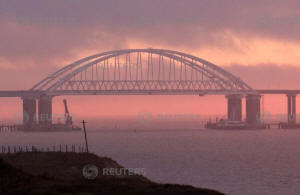|
Russia resists Western calls to free
captured Ukrainian ships
 Send a link to a friend
Send a link to a friend
 [November 26, 2018]
By Andrew Osborn and Maxim Rodionov [November 26, 2018]
By Andrew Osborn and Maxim Rodionov
MOSCOW (Reuters) - Russia resisted
international calls on Monday to release three Ukrainian naval ships
that its border patrols had fired on and seized near Crimea at the
weekend, triggering the most dangerous crisis in years between Moscow
and Kiev.
With relations still raw after Russia's 2014 annexation of Crimea from
Ukraine and its backing for a pro-Moscow insurgency in eastern Ukraine,
the incident risks pushing the two countries towards a wider conflict
and is likely to renew Western calls for more sanctions on Moscow.
Russia's FSB security service said its border patrol boats had seized
two small Ukrainian armoured artillery vessels and a tug boat after
opening fire on them and wounding several sailors on Sunday. It said it
had opened a criminal case into what it called the ships' illegal entry
into Russian territorial waters.
A spokeswoman for the Russian foreign ministry, Maria Zakharova, accused
Ukraine of sending the ships to deliberately provoke Russia and said the
ranking diplomat at Kiev's embassy in Moscow would be summoned over the
incident.

Kiev denied its ships had done anything wrong and accused Moscow of
military aggression. Ukraine's parliament was due to consider a proposal
later on Monday to impose martial law for 60 days after President Petro
Poroshenko met his top military and security chiefs on Sunday night over
the crisis.
Russia's rouble currency opened 0.4 percent weaker against the dollar in
Moscow, its lowest since mid-November, while Russian dollar-bonds fell.
Markets are highly sensitive to anything that could trigger new Western
sanctions, and therefore weaken the Russian economy. A fall in the price
of oil -- Russia's biggest source of revenue -- has made its economy
more vulnerable.
NAVIGATION RESUMES
The narrow Kerch Strait links the Black Sea and the Sea of Azov,
dividing Crimea from southern Russia. After annexing Crimea, Russia
built a giant road bridge across the Strait, increasing its control of
the waterway.
The crisis began on Sunday after Russia stopped the three Ukrainian
ships from entering the Sea of Azov by placing a cargo ship beneath the
bridge. Ukraine said a Russian ship had earlier rammed its tug boat in a
failed to attempt to stop it.
[to top of second column]
|

A general view shows a road-and-rail bridge, which is constructed to
connect the Russian mainland with the Crimean peninsula, at sunrise
in the Kerch Strait, Crimea November 26, 2018. REUTERS/Pavel Rebrov

Russia said the flotilla had not notified it in advance of its plans
and had ignored warnings to stop while manoeuvring dangerously.
Navigation resumed on Monday after Russia removed the cargo ship
blocking the Strait.
A bilateral treaty gives both Russia and Ukraine the right to use
the Sea of Azov, which is home to two of Ukraine's most important
ports.
A Reuters witness in Kerch, a port in Crimea, said the three
Ukrainian vessels were being held there.
People in Russian naval-style uniforms could be seen around the
vessels, which bore no sign of damage, the witness said. They could
be seen draping camouflage netting over the deck of one of the
vessels. There was no sign of the Ukrainian crew.
The FSB said three Ukrainian sailors had been wounded in the
incident and were getting medical care, adding that their lives were
not in danger.
The U.N. Security Council will meet on the latest developments at
the request of Russia and Ukraine later on Monday, diplomats said.
The European Union said it expected Russia to restore freedom of
passage via the Kerch Strait and urged both sides to act with the
utmost restraint to de-escalate the situation. A NATO spokeswoman
issued a similar appeal to both sides.
Poland, Denmark and Canada condemned what they called Russian
aggression.
Any decision to impose martial law in Ukraine would be unpopular in
some quarters as it would curb civil liberties and give state
institutions greater power ahead of a presidential election next
year which polls indicate Poroshenko would lose.
(Additional reporting by Tom Balmforth in Moscow, Stine Buch
Jacobsen in Copenhagen, Karin Strohecker in London and Joanna
Plucinska in Warsaw; Writing by Andrew Osborn/Christian Lowe;
Editing by Gareth Jones)
[© 2018 Thomson Reuters. All rights
reserved.]
Copyright 2018 Reuters. All rights reserved. This material may not be published,
broadcast, rewritten or redistributed.
Thompson Reuters is solely responsible for this content. |